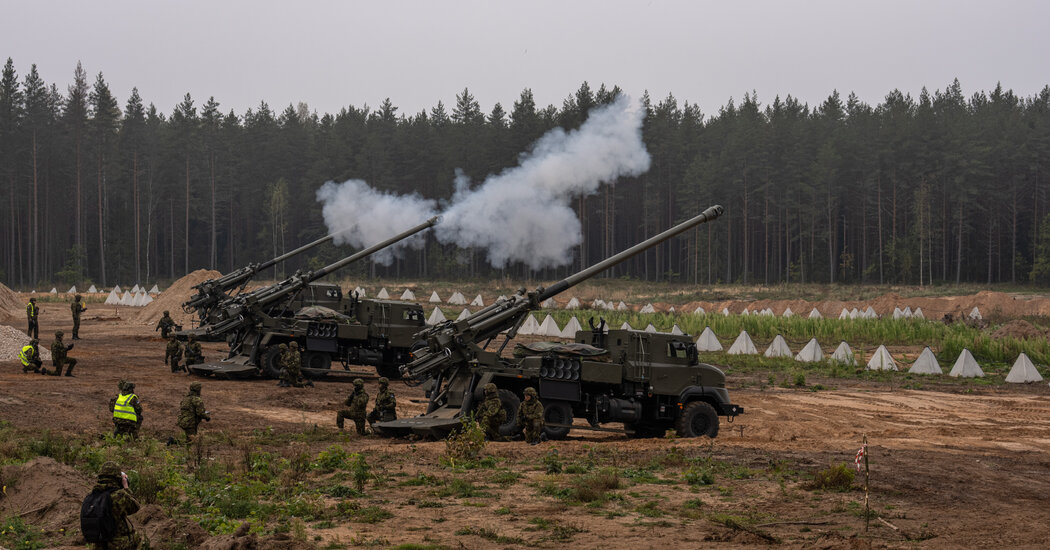A few days after Russian jets breached Estonian airspace for 12 tense minutes last month, Kusti Salm stood in an office overlooking the Tallinn airport, slapping a prototype of a miniature missile into his palm.
The missile, named the Mark 1, was developed last year to shoot down enemy drones at short range and is awaiting its debut on the global weapons market. Mr. Salm, chief executive of its manufacturer, Frankenburg Technologies, hopes it will fill a gap in Europe’s air defenses against Russia. “Clearly, we are unprepared,” he said.
Already, however, the 2-foot-long missile is part of a boom in Estonia’s defense industry that the government is banking on to lift its lagging economy. The effort is rooted in Estonia’s deep-seated national anxiety over Russia’s invasion of Ukraine and worries that it could be President Vladimir V. Putin’s next target.
“If we invest into new defense companies, they will offer high value in the Estonian economy,” the minister of economy and industry, Erkki Keldo, told reporters last month in Tallinn.
The investment also provides, he said, “reassurance that Estonia is well protected.”
Officials in Estonia, a former Soviet state that borders Russia, have for years worried aloud that their country, too, could be invaded if the war in Ukraine cools and Moscow has time to rebuild its military. Mr. Putin has long said he wants to stop NATO’s expansion into countries Russia considers part of its sphere, especially those that were part of the Soviet Union.
With a population of about 1.3 million people and one of NATO’s smallest militaries, Estonia has neither the capacity to build tanks, artillery guns and fighter jets, nor a big budget for buying many weapons from abroad.
But it is considered one of the most tech-savvy countries in the world, and Estonian officials are capitalizing on its digitally literate work force to produce defense systems reliant on robotics, artificial intelligence and cybersecurity.
The Mark-1 missile that Mr. Salm is hoping to sell to European militaries is guided by A.I. to target low-flying drones. Another company, CybExer Technologies, already counts the British, Ukrainian and Portuguese armies among its clients for software that tests online networks’ levels of protection against cyberstrikes. And the intelligence software firm SensusQ analyzes open-source information to aid responses on the battlefield and to emergencies.
“To be a small nation and small industry in this domain, you have to be somehow unique to be successful on the very tough defense market,” said Kalev Koidumae, head of Estonia’s defense and aerospace industry association. “It is to innovate your product.”
About 70 percent of the weapons and defense-related technology made in Estonia is exported to foreign customers. Last year, the country’s military industry revenues amounted to 500 million euro ($580 million), about €350 million of which was materiel sold overseas. That more than doubled revenues from about €200 million in 2020, including €46 million in exports.
Over those same years, Estonia’s economy plunged, at first during the Covid-19 pandemic and then again, after a healthy rebound in 2021, with the start of the war in Ukraine, according to the World Bank. The war prompted Estonia to stop buying cheaper energy from Russia, and consumer confidence fell, hurting investments, Mr. Keldo said. Now, the economy is slowly bouncing back, according to International Monetary Fund data updated this week. It projected about 0.5 percent growth in 2025.
At the same time, Estonia is spending more on defense. It plans to spend at least 5 percent of its gross domestic product on its military and other defenses by next year, nearly a decade ahead of NATO guidelines to do so. That amounts to more than €2.4 billion that Mr. Keldo said would be financed by taking out loans and cutting government spending elsewhere.
The spending increase includes about €50 million to help build factory space in eastern Estonia for defense companies, including for Frankenburg, the manufacturer of the miniature air defense missile, and a British company, Thor Industries Ltd, which produces plastic explosives.
Additionally, the Estonian government will offer another €100 million to defense start-up companies in need of capital.
Polls consistently show that most Estonians support the defense buildup, in part out of concern that Russia could attack or that the war in Ukraine will spread farther into Europe. That fear is largely rooted in Estonia’s history and proximity to Russia, and is shared by other countries in Eastern Europe.
The defense boom demonstrates how Estonian officials are trying to deter Russia, “even though they do not really expect invasion anytime soon,” said Donatas Kupciunas, a Baltics scholar at the Center for Geopolitics at Cambridge University in Britain. Russian cyber or hybrid attacks are more likely, Mr. Kupciunas said.
Estonians are more focused on deterrence, he said. “They are thinking more about, if Russia wants to do something crazy and if we are prepared, and they see what we have, then they would think twice,” he said.
In Tartu, Estonia’s second-largest city, the defense industry is an increasing part of a local economy that grew dramatically faster than the rest of the country’s from 2020 to 2023.
Home to the prestigious University of Tartu, the city has long been an incubator for tech start-ups like Playtech, the world’s largest online gaming software supplier. The founders of Skype and the ride-hailing app Bolt studied at the university, which is currently working with the robotics company Milrem on automated space and environmental-related projects.
Milrem also builds remote-controlled ground vehicles that can carry supplies or be outfitted with a small cannon. They have been sold to 19 militaries, including in eight NATO member states, and are being used in Ukraine.
“This is, of course, a growing sector in Estonia, as the defense spending is going drastically up, and it is growing in Tartu,” said the mayor of Tartu, Urmas Klaas.
New factories are opening as defense companies expand their operations in the area, he said, some of which produce equipment that also can be used for civilian purposes. That ensures job security for a manufacturing work force — keeping the economy stable — after military spending ebbs.
Mr. Klaas portrayed Russia as more of an irritant than an immediate threat, although two years ago the city built underground emergency shelters to protect 40,000 people and wants to expand them. Navigation systems for planes flying in and out of the local airport have mysteriously jammed, likely by Russia, he said.
But he said the result of the 12-minute incursion of Estonia’s airspace by Russian jets in September, which ended with NATO jets escorting them back into Russian territory, “showed us very clearly that NATO deterrence is working.”
“Our people know what kind of regime Russia has, but it is safe in Tartu,” Mr. Klaas said. “Even with an aggressive neighbor.”
Lara Jakes, a Times reporter based in Rome, reports on conflict and diplomacy, with a focus on weapons and the wars in Ukraine and the Middle East. She has been a journalist for more than 30 years.
The post A Tiny NATO Nation Is Cashing In on the Threat Next Door appeared first on New York Times.




